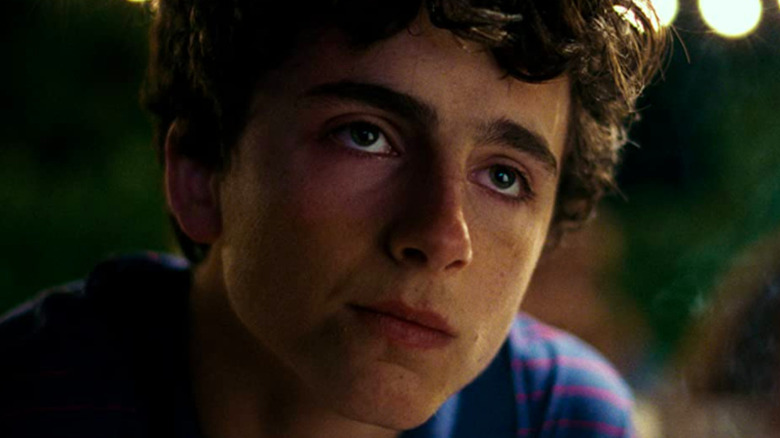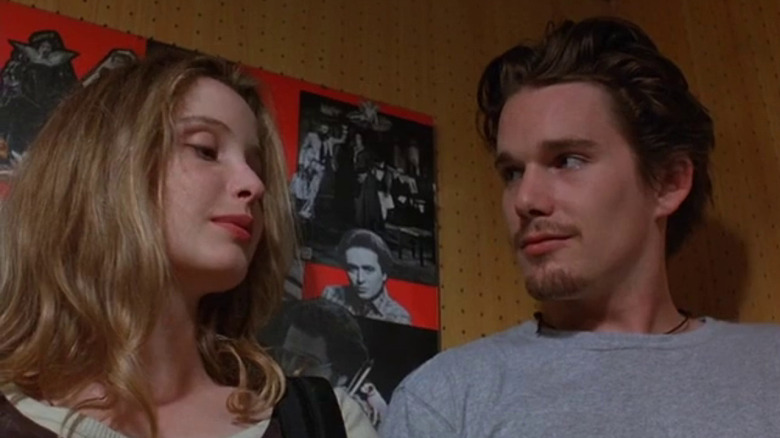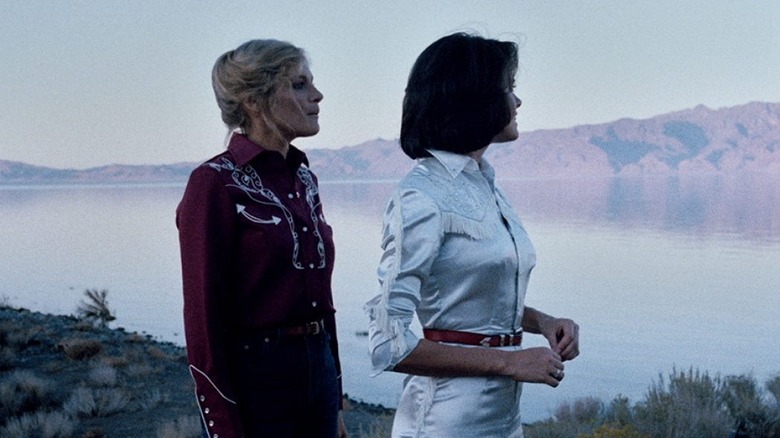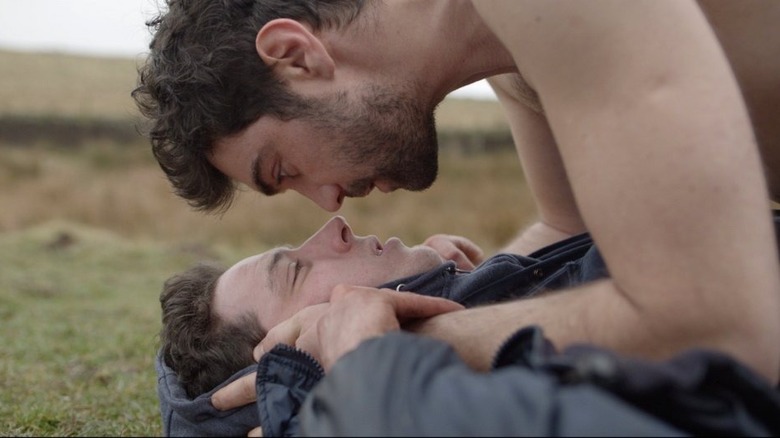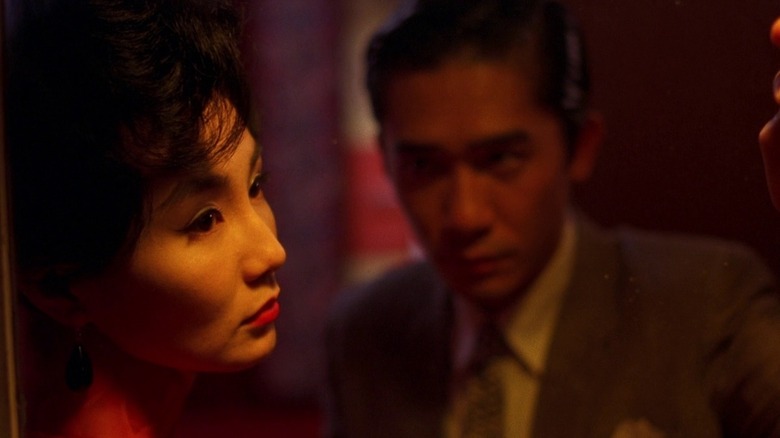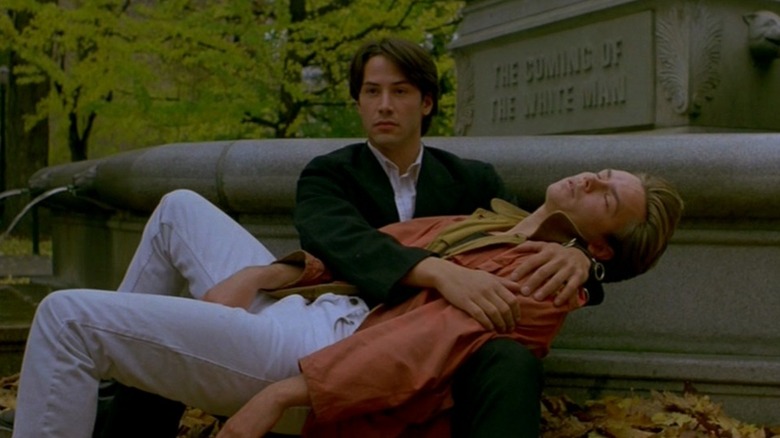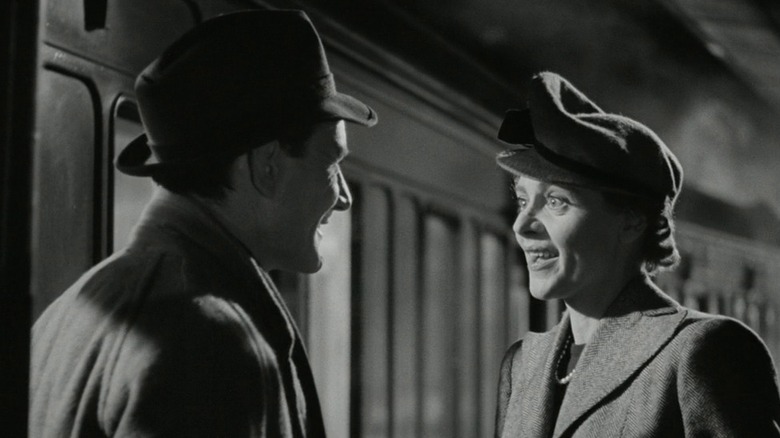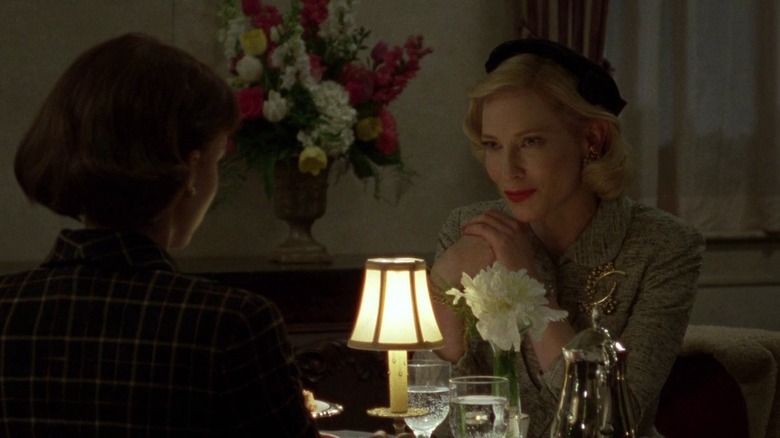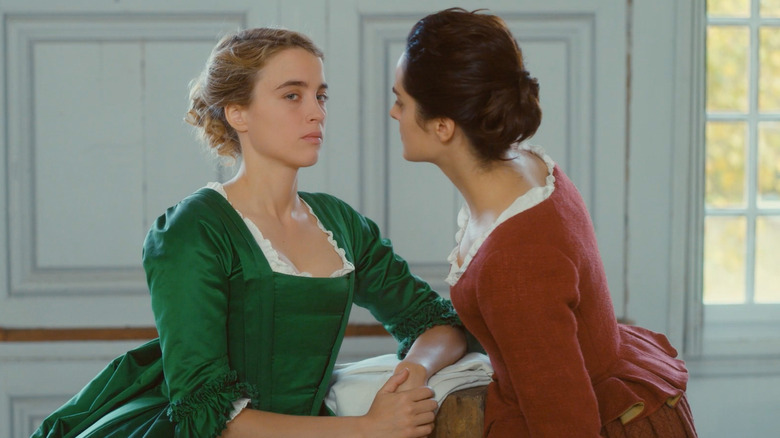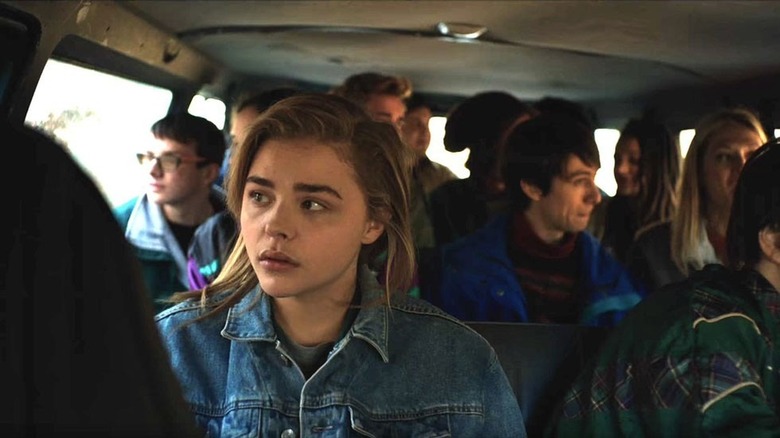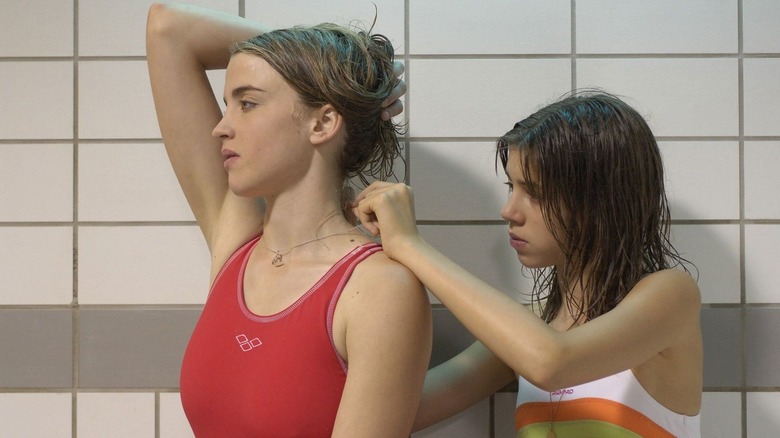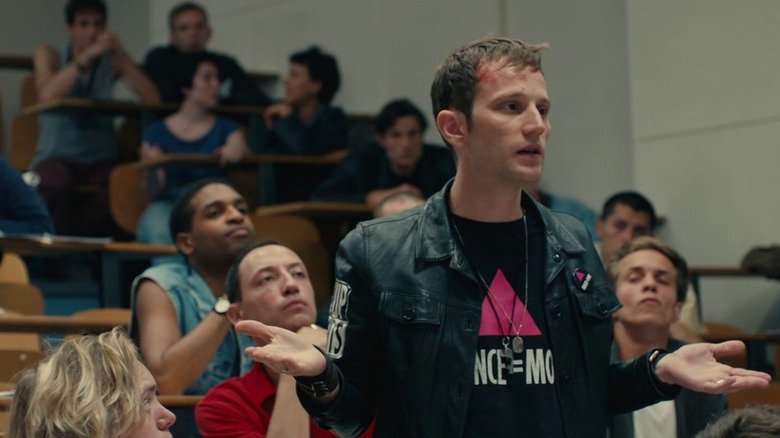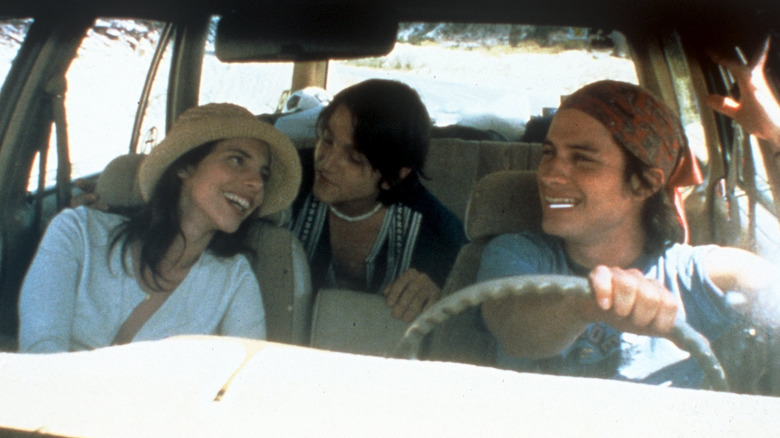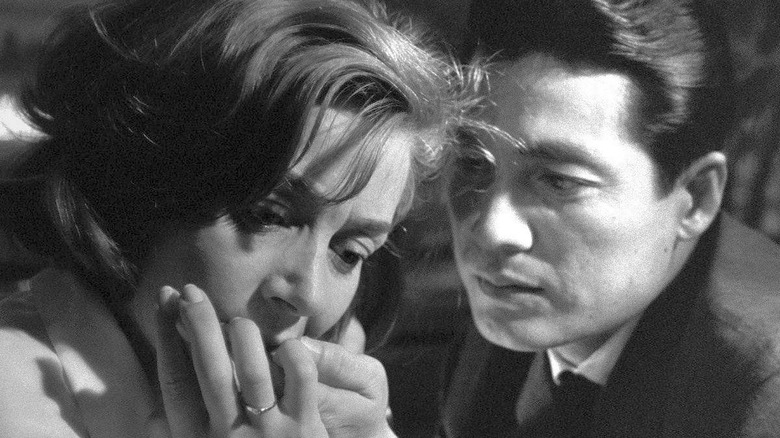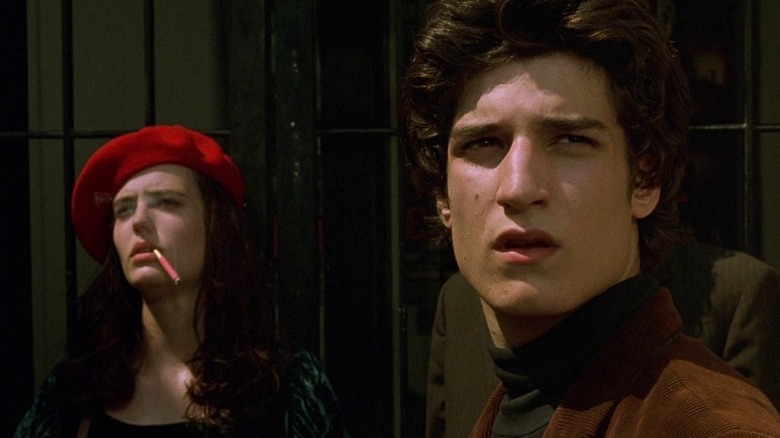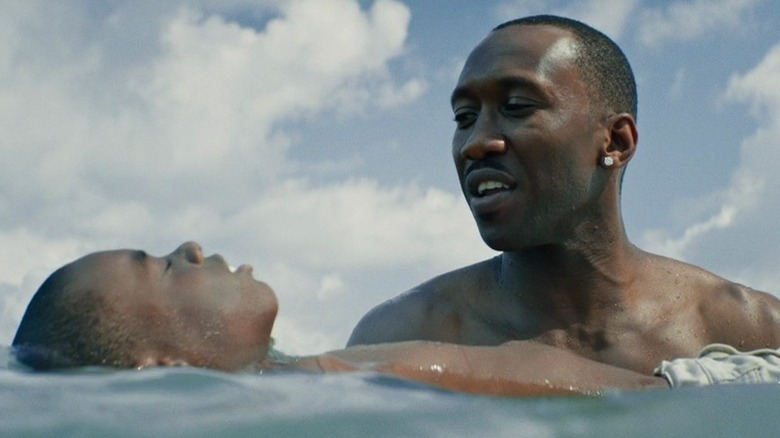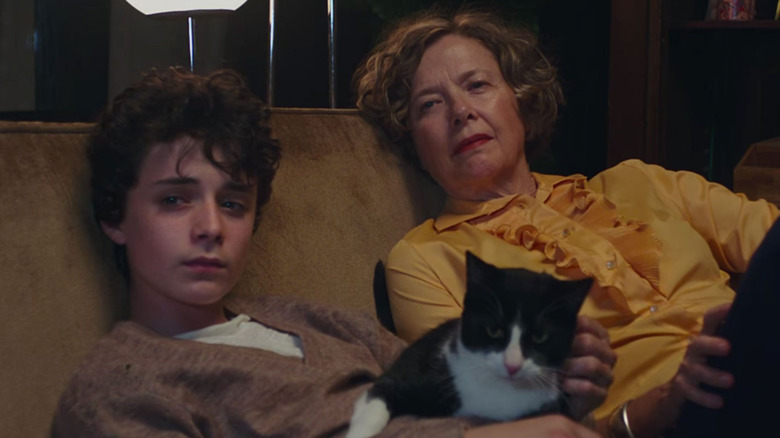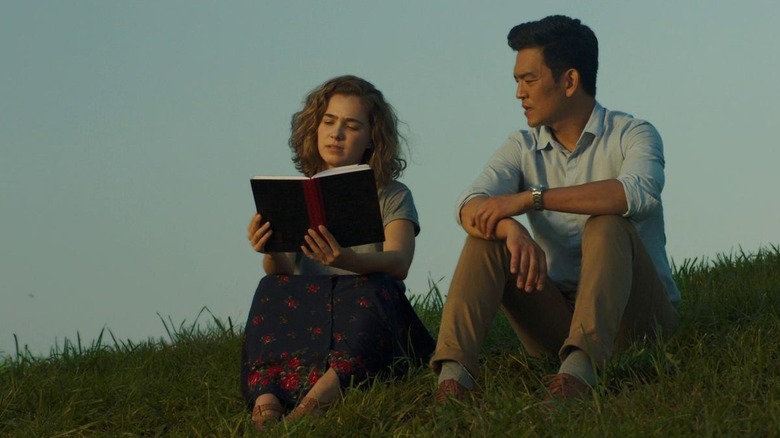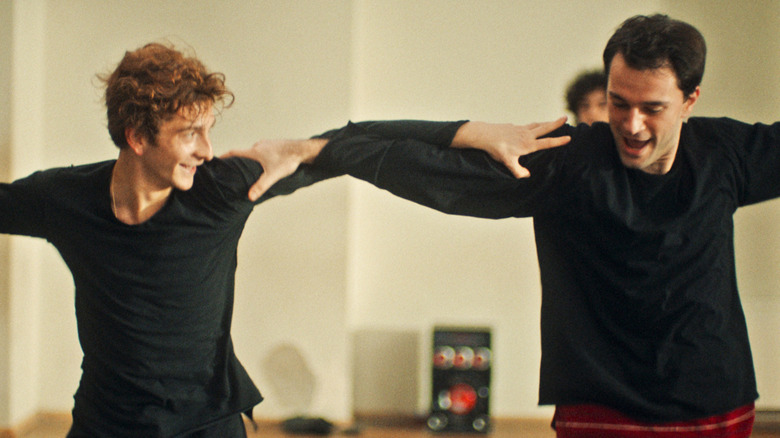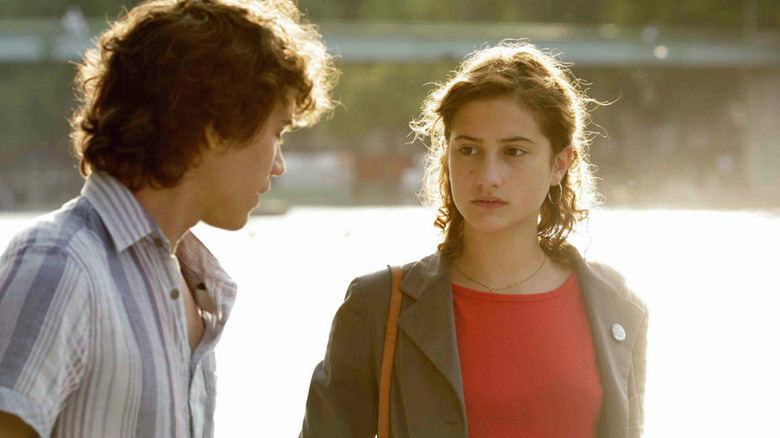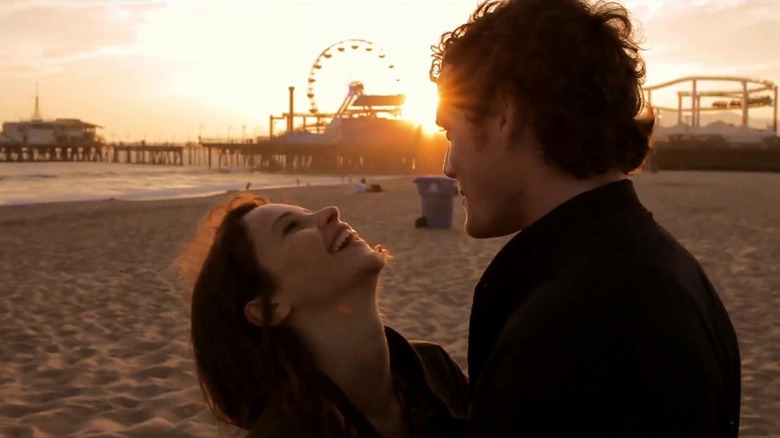20 Movies Like Call Me By Your Name You Need To Watch
We may receive a commission on purchases made from links.
2017 was the year of Timothée Chalamet. In November, his film "Call Me by Your Name" was released in the United States. The movie received four Oscar nominations, including one for Chalamet for Best Actor. It also became one of the most discussed films of the year, and looking back, it's clear why that was the case. Simultaneously a love story and a coming-of-age drama, "Call Me by Your Name" sees 17-year-old Elio (Chalamet) fall in love with Oliver (Armie Hammer), a 20-something grad student working with Elio's father.
Set in Northern Italy in the summer of 1983, the film follows Elio's experience of first love and shows how it changes him as a person. He experiences passion and heartbreak over the course of only a few short months, learning some important life lessons along the way. Directed by Italian filmmaker Luca Guadagnino, the film is sumptuously shot and absolutely beautiful to look at. Just as important as the look of the film is its phenomenal soundtrack, which features songs by singer-songwriter Sufjan Stevens.
Though "Call Me by Your Name" felt like a unique film at the time of its release, there are certainly others that explore similar themes and use comparable filmmaking techniques. Guadagnino had his own cinematic references for the film, and there are undoubtedly other movies that provide the same emotional catharsis. If you loved "Call Me by Your Name" and don't know what to watch next, look no further. Here are 20 movies you should check out.
The Before Trilogy
One of the most influential romance films of the modern age is not actually a single movie, but rather a trilogy. Richard Linklater's beloved 1995 film "Before Sunrise" is the first of three films that follow the love story of Jesse (Ethan Hawke) and Celine (Julie Delpy). Jesse and Celine first meet when they are college students traveling on a train through Europe. Jesse convinces Celine to get off with him in Vienna, and they spend all day and night there wandering the city before they must part ways in the morning (hence the film's title). The next two entries in the trilogy take place nine and 18 years later, respectively, following Jesse and Celine as their relationship develops.
Linklater's films are a stunning look at true love and how relationships grow over time. The first film begins as a tale of young love –- much like "Call Me by Your Name" -– while the sequels tackle the harsh reality of adulthood. If you're looking for a story to both invigorate and devastate you, set aside some time for the "Before" trilogy.
Desert Hearts
Though films like "Carol" and "Portrait of a Lady on Fire" are seen as some of the most significant lesbian movies of our time, they were not the first films to try to bring lesbian romance to the mainstream. Decades earlier, 1985's "Desert Hearts" blazed trails in the genre, earning recognition as one of the first positive onscreen portrayals of a romantic relationship between two women.
Directed by first-time feature filmmaker Donna Deitch, the film is set in 1959 and follows Vivian (Helen Shaver), an English professor in her mid-30s who travels to Reno, Nevada to get a divorce. While staying on the property of rancher Francis Parker (Audra Lindley), Vivian meets young Cay Rivers (Patricia Charbonneau), a free-spirited artist who doesn't care if anyone knows about her predilection for women. As you might be able to guess, the women fall in love, and the relationship changes both their lives.
Like "Call Me by Your Name," "Desert Hearts" depicts a relationship between two characters with a noticeable age gap. The difference in "Desert Hearts" is that it is Vivian, the older character, who learns something from her younger counterpart. "Desert Hearts" exemplifies the classic theme of love as transformation, and as an added bonus, it's totally stunning to look at. The film's cinematography was led by frequent Paul Thomas Anderson collaborator Robert Elswit, who does an exquisite job on the film.
God's Own Country
"God's Own Country" was released around the same time as "Call Me by Your Name" and received stellar reviews. Unfortunately, it didn't get achieve the same level of fame as Guadagnino's film did. Directed by Francis Lee, "God's Own Country" is set in Yorkshire and follows young shepherd Johnny Saxby (Josh O'Connor), who lives on a farm with his grandmother and his ailing father. Unhappy with his life, Johnny copes by binge drinking and having sex with strangers, but his life changes drastically when a Romanian migrant worker named Gheorghe (Alec Secăreanu) comes to work on the farm.
While they initially have a rather antagonistic relationship, the two men eventually develop a close bond, falling in love while helping birth lambs together. Like in "Call Me by Your Name," the environment in "God's Own Country" is extremely important. While beautiful, the Yorkshire landscape the characters inhabit is extremely isolated, which only serves to heighten the intensity of Johnny and Gheorghe's relationship. Though it's not quite a lighthearted film, "God's Own Country" is sure to stir your senses and maybe make you believe in the power of love a little bit, too.
In the Mood for Love
Arguably one of the most beautiful romantic dramas of all time, Wong Kar-wai's "In the Mood for Love" should be part of any conversation about modern cinematic love stories. Released in 2000 and set in 1960s Hong Kong, the film follows a journalist named Chow Mo-wan (Tony Leung Chiu-wai) who just moved into a new apartment with his wife, who is often away on business. Chow meets his neighbor, Su Li-zhen (Maggie Cheung Man-yuk), whose spouse is also gone much of the time. Su and Chow soon realize that their partners are having an affair, and they in turn start to develop feelings for one another.
One of the most beautifully shot and colored films of all time, "In the Mood for Love" is a melancholic look at a doomed romance. Much like another influential romantic drama, "Brief Encounter," "In the Mood for Love" depicts a love affair that both parties can't believe is happening. While it's certainly more mature and less playful than a film like "Call Me by Your Name," it should be required viewing for anyone who's a fan of the romance genre.
My Own Private Idaho
If you liked "Call Me by Your Name" but don't know much about the history of LGBTQ+ cinema, here's a little lesson for you. During the 1990s, there was a filmmaking movement called "New Queer Cinema" that was comprised of a number of independent films made in North America and the U.K. Filmmakers like Greg Araki, Todd Haynes, and Cheryl Dunye are all seen as architects of this new movement.
One of the earliest and most prominent films produced by this generation of filmmakers is Gus Van Sant's 1991 film "My Own Private Idaho." The movie follows Mike Waters (River Phoenix), a gay male sex worker who suffers from narcolepsy. His best friend Scott Favor (Keanu Reeves) is in the same line of work, but he's also the heir to a significant family fortune. The two friends embark on a road trip to find Mike's estranged mother, taking work with various clients along the way to make a living, all while Mike grapples with the feelings he has for his best friend.
Like "Call Me by Your Name," "My Own Private Idaho" is something of a coming-of-age story, albeit with less explicit romance. While the film may not have a typical romantic or heroic narrative (per Roger Ebert), it does offer a strikingly original queer perspective that hadn't been seen in cinema up to that point.
Brief Encounter
Though he is best known for large-scale epics like "Lawrence of Arabia" and "The Bridge on the River Kwai," British director David Lean once made a quiet, understated film that The Guardian called the "best romantic film of all time." "Brief Encounter," released in 1945, is a beautiful and heartbreaking film that has inspired many other romances over the decades.
The story follows restless suburban housewife Laura Jesson (Celia Johnson), who has a chance encounter with a kind doctor named Alec Harvey (Trevor Howard) at a train station. What begins as a casual acquaintance soon develops into much more, as Laura and Alec must take account of what their feelings for one another mean in the grand scheme of their lives. Based on Noël Coward's one-act play "Still Life," the film is a succinct 86 minutes, focusing solely on Laura and Alec's weekly meetings at the train station. "A Brief Encounter" still holds up as an evocative and tender love story, and you should definitely add it to your list if you want to get more familiar with the classics.
Carol
First released at the end of 2015, "Carol" follows Therese (Rooney Mara), a young woman working in a toy shop over the holidays in 1950s Manhattan. While there, she meets Carol (Cate Blanchett), a suburban housewife who has come to find a doll for her daughter. The two women eventually embark on a love affair and take a road trip across the country together. Their getaway is interrupted when Carol's (soon to be ex) husband (Kyle Chandler) intervenes, but both women's lives are changed by the journey. According to director Todd Haynes (via IndieWire), "Carol" was heavily influenced by romance classics, particularly "Brief Encounter." They have a very similar structure — both starting and ending with the same scene — they both feature trains prominently, and they share several similar shots.
There are a number of similarities between "Call Me by Your Name" and "Carol" as well. Though Therese is slightly older than Elio, "Carol" still functions as something of a coming-of-age story, as Therese finds herself maturing a lot by the end of the film. Carol, who is significantly older than her, helps Therese to come into her own as a young woman, and her journey is also one of self-determination. Like "Call Me by Your Name," "Carol" was nominated for several Oscars, with both Blanchett and Mara earning nods for their performances. If you haven't yet seen this film yet, now's a perfect time.
Portrait of a Lady on Fire
If 2015 was the year of "Carol," 2016 the year of "Moonlight," and 2017 the year of "Call Me by Your Name," then 2019 was certainly the year of "Portrait of a Lady on Fire." Together, these four queer-centric films have helped usher in a new era for LGBTQ+ storytelling on the big screen with their universal influence and acclaim. A masterpiece of lesbian cinema and a totally novel take on what we might call the "female gaze," "Portrait of a Lady on Fire" is a film made by French director Céline Sciamma. The story is set in 18th-century France and follows Marianne (Noémie Merlant), an artist who is hired to paint the wedding portrait of Héloïse (Adèle Haenel), a headstrong young woman who has just left a convent.
Because Héloïse does not want to be painted, Marianne must paint her in secret. Despite that treachery, the two women eventually fall in love, learning about the power of equality, freedom, and subjectivity through their relationship. Marianne and Héloïse are both significantly older than Elio, but they still learn and grow a lot over the course of the story. To put it simply, through their love -– and the symbiotic dynamic they share -– they learn how to stand on their own as subjects, rather than objects, in the world that they inhabit. It's a profound lesson, and one that fans of "Call Me by Your Name" in particular might be interested in witnessing.
The Miseducation of Cameron Post
Directed by filmmaker Desiree Akhavan, 2018's "The Miseducation of Cameron Post" is based on the 2012 novel of the same name by Emily M. Danforth. Set in 1993, the film follows Cameron Post (Chloë Grace Moretz), a teenager who is dating her girlfriend Coley (Quinn Shephard) in secret. When the two are discovered, Cameron gets sent to a conversion therapy center called God's Promise. While the staff at the center try to rid the "disciples" of any remnants of their queerness, Cameron finds herself bonding with two of the residents –- Jane Fonda (Sasha Lane) and Adam Red Eagle (Forrest Goodluck) –- who support each other despite their unwelcome circumstances.
"The Miseducation of Cameron Post" is certainly more somber than other films on the same topic like "But I'm a Cheerleader," but it retains a strong sense of optimism. Though the characters in the film are in a very unsafe situation, the story focuses more on Cameron and her friends' unity and efforts to be free than it does on their imprisonment. If that sounds up your alley, then you should add "The Miseducation of Cameron Post" to the queue.
Water Lilies
"Portrait of a Lady on Fire" director Céline Sciamma's first three films are part of what she has called a loose trilogy of coming-of-age stories (via Harper's Bazaar). The first entry in this trilogy is 2007's "Water Lilies," which was Sciamma's debut film. The movie follows 15-year-old Marie (Pauline Acquart), who lives in suburban Paris. Marie is desperate to join the synchronized swimming team after developing a crush on the team captain, Floriane (Adèle Haenel of "Portrait of a Lady on Fire").
Marie and Floriane begin spending more time together, and Marie starts seeing less of her best friend, Anne (Louise Blachère). The three girls begin exploring their sexual desires, each having their own (often unsatisfying) experiences. Though certain parts of "Water Lilies" can be difficult to watch, it's an achingly realistic exploration of first love and first lust, and it's an interesting watch in particular for fans of "Portrait of a Lady on Fire."
BPM (Beats Per Minute)
"BPM (Beats per Minute)" isn't a movie you should watch unless you're prepared to be mildly devastated. The film follows Nathan (Arnaud Valois), a young man living in Paris in the early 1990s. Nathan, who doesn't have HIV, joins AIDS activist group ACT UP and begins attending weekly meetings. He learns more about the organization and the different strategies of its members, eventually falling in love with Sean (Nahuel Pérez Biscayart), a member of the group who is dying from AIDS.
The film, which came out in 2017 and is directed by Robin Campillo, serves two purposes. It is a beautiful, tragic love story, as well as an informative look at French AIDS activism in the 1990s. Though it is undoubtedly sad, the story also takes care to linger on the moments of happiness and joy that these activists experienced in their lives. Plus, "BPM" is yet another film that stars Adèle Haenel (representing the lesbian set within AIDS activism), so a Haenel triple feature may be in your future.
Y tu mamá también
One of the greatest coming-of-age films of the 2000s, "Y tu mamá también" is helmed by "Gravity" and "Roma" director Alfonso Cuarón. The 2001 film follows two 17-year-old friends, Julio (Gael García Bernal) and Tenoch (Diego Luna), who live in Mexico City. Over the summer, they decide to go on a road trip, taking Luisa (Maribel Verdú), a woman in her late 20s who they recently met, with them. Julio and Tenoch are ruled by hormones and a passion for adventure, and over the course of the trip, all three characters develop an intimate bond with one another.
Like "My Own Private Idaho" and, to a certain extent, "Carol," "Y tu mamá también" is a road trip movie that explores the freedom that travel can bring. While Luisa goes on a journey of self-discovery in her own right, she also helps Julio and Tenoch develop a deeper relationship with themselves and with each other. It's a joyful, touching, and frequently raunchy film that manages to depict teenage boys with more grace and empathy than most other films even come close to doing. Strap in, and enjoy the ride.
Hiroshima Mon Amour
When most people think of the French New Wave, they think of directors like Jean-Luc Godard and François Truffaut, who made most of their famous films in the 1960s. One early movie of the French New Wave that doesn't get as much love as it should these days is Alain Resnais' 1959 film "Hiroshima Mon Amour," which was written by French novelist Marguerite Duras. Set and filmed entirely in Hiroshima in the aftermath of World War II, the film follows a Japanese architect (Eiji Okada) and a French actress (Emmanuelle Riva) who spend a day together discussing their lives and their past experiences.
The actress is in Hiroshima to make an anti-war film, and the architect tells her about the devastation that atomic weapons have wrought on his home. In turn, the actress tells the architect about her first love, a German soldier who died during the war. Both the architect and the actress are married, but they find solace in their brief affair, engaging in stimulating, intimate conversations throughout the 24 hours they spend together. Powerful and concise, "Hiroshima Mon Amour" is 90 minutes of the most beautiful conversations you can imagine. If you're looking for another hugely influential romance to add to the docket, "Hiroshima Mon Amour" should be next.
The Dreamers
"Call Me by Your Name" director Luca Guadagnino has spoken before about what a huge influence Italian director Bernardo Bertolucci has been in his career, so it's only right that we include one of his films here. Talking with Crash, Guadagnino recalled that, as a child, "Bertolucci meant cinema for me, and I couldn't think of cinema without thinking of Bertolucci." Though the director is probably most well-known for pictures like the (in)famous "Last Tango In Paris" and the epic 5-hour-long "1900," the film we're talking about today is a bit more accessible for those new to his films.
Released in 2003, "The Dreamers" is set in 1968 Paris — a time and place marked by historic protests and civil unrest. The film follows an American exchange student named Matthew (Michael Pitt) and a pair of twins — Théo (Louis Garrel) and Isabelle (Eva Green). Matthew is enchanted by the connection between Théo and Isabelle, who were conjoined at birth. The trio bond over their love of film, and when Théo and Isabelle's parents are out of town, they ask Matthew to stay with them, immersing themselves in pleasure and fantasy. Though Bertolucci is himself an Italian filmmaker, the film feels very French in every way you might expect, and it gorgeously depicts Matthew's chic, cigarette-laden coming of age. If you're looking for a film where three young people sprint through the Louvre, you won't be disappointed.
Moonlight
At this point, "Moonlight" is so well known (and deservedly so) that you've likely already seen it, but if you needed one final push to finally watch this masterpiece, consider this it. Released in 2016 and directed by Barry Jenkins, the film follows Chiron, a young Black man growing up in Liberty City, Miami. The story of "Moonlight" looks at three chapters of his life -– his early youth (Alex R. Hibbert), adolescence (Ashton Sanders), and adulthood (Trevante Rhodes) –- exploring themes of sexuality, identity, and self-worth.
When his mother (Naomie Harris) struggles to raise him due to financial problems and her own drug addiction, Chiron is taken in by a kind drug dealer named Juan (Mahershela Ali) and his girlfriend Teresa (Janelle Monáe), who teach him important lessons about manhood. As a teenager, Chiron develops a close relationship with his friend Kevin (Jharrel Jerome), who is the only person Chiron truly allows himself to be intimate with. It's a stunning film filled with sensitive and nuanced characters and some of the most beautiful images of Miami you've ever seen. If you're still curious as to what the hype is all about, it's not too late to check out this one-of-a-kind story of love and self-acceptance.
If you or anyone you know is struggling with addiction issues, help is available. Visit the Substance Abuse and Mental Health Services Administration website or contact SAMHSA's National Helpline at 1-800-662-HELP (4357).
20th Century Women
Director Mike Mills is known for making films that explore relationships between parents and children. Arguably his magnum opus on this topic is the 2016 film "20th Century Women." The movie is set in 1979 Santa Barbara, California, and follows 15-year-old Jamie (Lucas Jade Zumann), who lives with his unusual mother Dorothea (Annette Bening). Also living with them are William (Billy Crudup), a carpenter and mechanic, and Abbie (Greta Gerwig), a 24-year-old photographer who has just learned she has cervical cancer.
Worried that she is failing as a mother, Dorothea enlists the help of Jamie's best friend Julie (Elle Fanning) and Abbie to ensure that Jamie will grow up to be a good man. Abbie teaches Jamie about punk rock and feminist theory, while Julie and Jamie explore intimacy through an occasionally tumultuous relationship. It's an incredibly specific and personal story -– as most of Mills' films are –- and it feels unique to the time and place in which it is set. If you're looking for a film that gets to the heart of growing up and what it means to find your place in the world, "20th Century Women" should be your next watch.
Columbus
Filmmaker Kogonada's 2017 film "Columbus" is probably the movie on this list most connected to its sense of place. Though the beautiful landscape of Northern Italy is certainly important to the overall look and feel of "Call Me by Your Name," "Columbus" is really a film that is at its core about the characters' relationship to a specific location. Set in the titular town of Columbus, Indiana, the film follows Casey (Haley Lu Richardson), a young aspiring architect born and raised in Columbus who works at the library and gives architecture tours around the city. Casey meets Jin (John Cho), a man visiting from South Korea to be with his estranged father — a successful architect — who has fallen ill while visiting the city on a lecture tour.
Casey, who has grown up in Columbus and knows everything there is to know about the city's famous buildings, loves her home and doesn't feel like she can leave because she needs to take care of her mother (Michelle Forbes), who's recovering from drug addiction. Jin, on the other hand, isn't interested in architecture because it reminds him of his father, with whom he did not have a good relationship. Eventually, both characters come to terms with the things that are holding them back, and their relationships with the city and with architecture in general develop over the course of their time together. It's a quiet, aesthetically astonishing film that tells its coming-of-age story in less dramatic terms than we've come to expect from the genre. If calming energy is what you're looking for, "Columbus" might be just the thing for you.
And Then We Danced
Set in the country of Georgia, 2019's "And Then We Danced" is a film from Swedish director Levan Akin. The story follows Merab (Levan Gelbakhiani), a young dancer at the National Georgian Ensemble who has been training for years for a spot in the company. Merab is thrown for a loop when a cocky newcomer named Irakli (Bachi Valishvili) comes on the scene and replaces him in a dance. Though there's antagonism between the two dancers at first, they eventually bond during rehearsal, later becoming lovers as well as rivals.
Merab and Irakli's relationship is complicated, however, mainly because of the homophobic society in which they live, which prizes traditional masculinity above all else. Despite many setbacks, Merab continues dancing, not letting his misfortunes get in the way of his dream. "And Then We Danced" illustrates both the harshness of homophobic environments and the pockets of joy that can still be found despite them. A compelling queer narrative that has a lot to say about standards of masculinity, "And Then We Danced" is well worth your attention.
Goodbye First Love
While Mia Hansen-Løve's "Bergman Island" launched her to a new level of popularity and acclaim, the director was making movies long before then. Her third film, 2011's "Goodbye First Love," is the one that pairs best with "Call Me by Your Name." The story follows 15-year-old Camille (Lola Créton) and 19-year-old Sullivan (Sebastian Urzendowsky), who have just fallen in love for the first time. However, the honeymoon period comes to an end when Sullivan takes a 10-month trip to South America with his friends, leaving Camille behind. While on the trip, Sullivan writes to Camille to tell her they should break up, and they part ways.
The rest of the film takes place several years later, as Camille and Sullivan try to reconnect after a long time apart. They struggle to decide if their relationship is still worth fighting for while at the same time being unable to truly say goodbye. Like "Call Me by Your Name," which ends with Elio crying while Sufjan Stevens' "Mystery of Love" plays in the background, "Goodbye First Love" has a melancholic and musical finale. Both films use powerful acting and great soundtracks –- rather than explicit narrative exposition –- to explore the finer points of the story, making them a compelling cinematic pair.
Like Crazy
Released in 2011, "Like Crazy" is another romantic and at times devastating tale of first love. The story follows Jacob (Anton Yelchin), an American student, and Anna (Felicity Jones), an exchange student from London. The two seem like soulmates at first, but when Anna overstays her visa and is denied entrance back into the United States, their romance hits a major roadblock.
Anna and Jacob both find it very difficult to maintain a long-distance relationship with their changing lives and the demands of their jobs, but they somehow find their way back to one another, time and time again. "Like Crazy" could certainly be described as a somewhat melancholic movie, and it is made all the more so considering the untimely passing of Yelchin several years after the film was released. Nonetheless, it is a decidedly heartfelt and moving film with gripping performances from both lead actors. If you want a little more wistfulness in your life after watching "Call Me by Your Name," "Like Crazy" should be your next stop.
